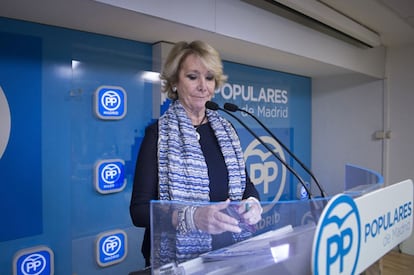A warning to the prime minister
Esperanza Aguirre’s resignation on Sunday should send out a clear message to Rajoy

The Popular Party (PP) faces the pressing need to pay its dues to society over some of its past practices. While it is not the only group to be affected by corruption, it is one of those that has done the least to implement reforms.
Party leaders have been subject to the needs of acting Prime Minister Mariano Rajoy, who put the brakes on a wave of attempted resignations triggered by the PP’s dismal showing at municipal and regional elections in May 2015.
Since then, these leaders have remained quiet – that is, until this past Sunday, when Esperanza Aguirre, head of the PP’s Madrid branch, announced her resignation over her inability to remain at the helm of a structure riddled with corruption suspects.
In these conditions, it seems impossible for any other party to help Rajoy get reinstated as PM
Aguirre has good reasons to take responsibility. As the Púnica investigation progresses, there is growing suspicion about the seriousness of the acts that may have been committed by aides of hers who once wielded great power and influence.
Meanwhile, the massive probe into the Gürtel kickbacks-for-contracts scheme has already made it clear that nobody and nothing was putting a check on corruption or on the fraudulent use of taxpayers’ money.
The question was not how much longer Aguirre could hold out, but rather, how come she had not resigned sooner.
What’s happened in Madrid is that the judge and the Civil Guard have been putting two and two together and reaching a logical conclusion: if the former secretary general of the party in the Madrid region, Francisco Granados, is suspected of corruption on a large scale, then the entire party may be infected.
“There is something serious going on there,” admitted Aguirre in her Sunday press conference.
It is abusive for authorities and party leaders involved in corruption investigations to try to hang on to their posts come hell or high water. Politicians have to answer to their voters, not just to the judges. The abuse committed by the constant mixing of the legal and political levels has led many voters to turn their backs on corrupt parties.
Aguirre has good reasons to take responsibility
A new generation of politicians has either enforced or accepted an agenda of reform, and it is now suicidal for corruption suspects to seek refuge in legal loopholes just to keep their place in politics.
But it is not just them: party chiefs have to be accountable for the proper management of taxpayers’ money by the individuals who work for them. They also have to be responsible for staging clean election campaigns, which have been tainted by corruption stemming from violations of political financing legislation.
Unfortunately for Rajoy, there was (alleged) corruption within the central structure of the party with which he has been both secretary general and prime minister, as demonstrated by the involvement of several national party treasurers in criminal investigations. And it was also there in the Madrid organization – an allegation that has not helped him politically – and the Valencian branch, which happens to be one of his most important backers.
The PP remains jammed by Rajoy, who has suspended all regional conventions until the national one is held, although the date for this has been postponed until further notice. But this is not stopping the wave of scandals that rises with every new step taken by the courts, where numerous cases affecting the party remain pending.
In these conditions, it seems impossible for any other party to help Rajoy get reinstated as prime minister. The sooner he understands this, the less complicated it will be to form a new executive in Spain following the December 20 general election.
English version by Susana Urra.
Tu suscripción se está usando en otro dispositivo
¿Quieres añadir otro usuario a tu suscripción?
Si continúas leyendo en este dispositivo, no se podrá leer en el otro.
FlechaTu suscripción se está usando en otro dispositivo y solo puedes acceder a EL PAÍS desde un dispositivo a la vez.
Si quieres compartir tu cuenta, cambia tu suscripción a la modalidad Premium, así podrás añadir otro usuario. Cada uno accederá con su propia cuenta de email, lo que os permitirá personalizar vuestra experiencia en EL PAÍS.
¿Tienes una suscripción de empresa? Accede aquí para contratar más cuentas.
En el caso de no saber quién está usando tu cuenta, te recomendamos cambiar tu contraseña aquí.
Si decides continuar compartiendo tu cuenta, este mensaje se mostrará en tu dispositivo y en el de la otra persona que está usando tu cuenta de forma indefinida, afectando a tu experiencia de lectura. Puedes consultar aquí los términos y condiciones de la suscripción digital.








































